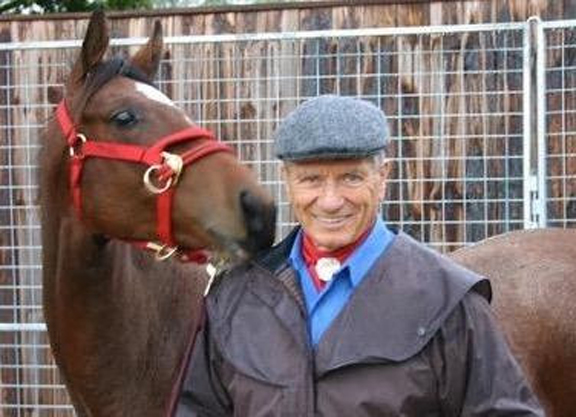Horseman Monty Roberts, known as “The Man Who Listens to Horses,” has joined the Water Hay Oats Alliance, a grassroots movement seeking the passage of federal legislation to prohibit the use of performance-enhancing drugs in horse racing.
In a statement in support of the group, Roberts said:
Recent circumstances have served to bring me to a final conclusion regarding the organization WHOA. This organization supports the notion that horses should perform in racing without the assistance of drugs. The initials stand for Water, Hay, Oats Alliance.
It has been my life's passion to teach trainers, owners, and lovers of horses to treat them with respect and in the most positive light possible. So, recently I decided to seek the advice of many whom I believe to be at the top of their professions to help me analyze the factors for clean racing as proposed by WHOA.
It shocks me to realize that certain statements have been made to me over my years in the horse industry that are absolutely false when it comes to the use of drugs. Lasix sits at the heart of drug use with Thoroughbred horses in the United States. Those of us who travel the world in this industry realize that virtually all of the other racing countries execute their racing under the guidelines proposed by WHOA. There, the horses race and the industry goes forward, drug free.
For the past few decades, one could open the racing program at any track in the United States and see that most of the entries performed with the circled L behind their name. Several different veterinarians personally told me that approximately 80% of the horses in racing in the U.S. are bleeders needing Lasix. But recently I learned from high-level individuals that studies show it is more likely that a realistic number of horses in which bleeding is a significant problem would be in the area of 2-4%, not anywhere near the 95% of those horses who raced on Lasix last year.
Also, many years ago it came to my attention that Lasix encumbered the testing procedures so as to mask performance-enhancing drugs. I am now of the opinion that many people actively engaged in racing have either been misinformed through ignorance or misinformed for monetary reasons.
My goal is for us to be as fair with the horses as we possibly can be. After decades of studying the issue and listening to knowledgeable veterinary experts, I have looked at both sides of this issue and I am hereby casting my support to WHOA and its efforts to bring about medication reform. It humbles me to be included on the list of these legends of our industry.
WHOA has raised awareness that the Thoroughbred industry has public relations issues that will not likely go away without change in the administration of drugs. For the health and welfare of our horses, I ask people to study the issues and support WHOA's efforts to improve our industry and the lives of our partners, the horses.
Not a subscriber? Click here to sign up for the daily PDF or alerts.






